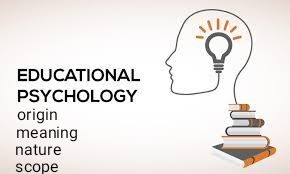Educational psychology
Origin
Meaning
Nature
Scope of educational psychology
 |
| Educational psychology |
What is Educational Psychology?
Educational psychology is a branch of psychology that focuses on understanding how people learn and develop in educational settings. It involves studying various factors that influence learning, such as cognitive processes, motivation, social interactions, and individual differences.
Educational psychologists use their knowledge to improve teaching methods, curriculum design, and educational interventions to enhance learning outcomes for students of all ages. They may also work with teachers, parents, and administrators to address learning difficulties, behavioral issues, and other challenges in educational settings.
Definition of educational psychology;
Educational psychology is a branch of psychology that focuses on understanding how individuals learn and develop in educational settings. It involves the study of various psychological processes, such as cognition, motivation, and social interaction, and how they influence learning and educational outcomes.
Educational psychologists apply their knowledge to improve teaching methods, curriculum design, and educational interventions to enhance the learning experience and promote academic success for students of all ages.
Origin of educational psychology:
The origin of educational psychology can be traced back to the late 19th and early 20th centuries. During this time, there was a growing interest in understanding how individuals learn and how educational practices can be improved.
One of the key figures in the development of educational psychology was Wilhelm Wundt, a German psychologist who is often referred to as the "father of experimental psychology." Wundt's work focused on studying human consciousness and perception, and he believed that these processes could be applied to educational settings.
Another influential figure in the origin of educational psychology was Edward Thorndike, an American psychologist who conducted extensive research on learning and intelligence.
Thorndike's work emphasized the importance of individual differences in learning and the use of scientific methods to study the individuals psychological capabilities.
[Download Here 200 E-book mega collection]
Meaning of educational psychology;
Educational psychology is a branch of psychology that focuses on understanding how people learn and develop in educational settings. It involves the study of various psychological processes, such as cognition, motivation, and social interaction, and how they impact learning and educational outcomes.
Educational psychologists use their knowledge to develop and implement effective teaching strategies, design educational programs, and provide support and guidance to students, teachers, and parents.
The ultimate goal of educational psychology is to enhance the educational experience and promote optimal learning and development for individuals of all ages.
Psychology is the scientific study of the human mind and behavior. It involves understanding and explaining how individuals think, feel, and act, as well as how they interact with others and their environment.
Psychology seeks to uncover the underlying processes and mechanisms that influence human behavior, including cognitive processes, emotions, motivations, personality traits, and social interactions. It also aims to apply this knowledge to improve mental health, well-being, and overall quality of life.
ALSO READ: Meaning and definition of psychology, branch of psychology.
Nature of educational psychology:
Educational psychology is a branch of psychology that focuses on understanding how individuals learn and develop in educational settings. It involves the study of various psychological processes, such as cognition, motivation, and social interaction, and how they impact learning and educational outcomes.
Educational psychologists apply their knowledge and research findings to improve teaching methods, curriculum design, and educational policies. They work with teachers, students, parents, and administrators to address learning difficulties, enhance educational experiences, and promote positive learning environments.
The nature of educational psychology is multidisciplinary, drawing from fields such as psychology, education, sociology, and neuroscience. It combines theories and principles from these disciplines to understand and explain educational phenomena.
Educational psychologists conduct research to investigate various aspects of learning, such as memory, intelligence and individuals psychological capabilities.
Scope of educational psychology:
The scope of educational psychology is broad and encompasses various aspects related to learning, teaching, and educational settings. Some key areas within the scope of educational psychology include:
1. Learning and development:
Educational psychologists study how individuals acquire knowledge, develop skills, and grow intellectually and emotionally. They examine factors that influence learning, such as cognitive processes, motivation, and individual differences.
2. Instructional design and assessment: Educational psychologists contribute to the development and evaluation of instructional materials, methods, and strategies. They analyze the effectiveness of different teaching approaches and assess students' learning outcomes.
3. Classroom management and behavior: Educational psychologists study classroom dynamics, including student behavior, discipline, and social interactions. They provide strategies and interventions to promote positive behavior and create a conducive learning and experience.
ALSO READ: what is sociology? Origin, definition, needs of sociology in education.
0 comments:
Post a Comment
Please do not spam the inbox